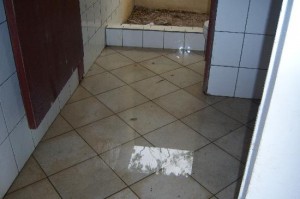Posted by Teresa on June 14, 2013 under Fair Housing Act, Landlord and Tenant FAQs | 
 Between the Fair Housing Act and the Americans With Disabilities Act, it’s clear that landlords must accommodate tenants with disabilities. If your rental property is of a certain size and age, it’s probably already built to accommodate wheelchairs. And if a unit is to be leased by a person with disabilities, you must allow them to make reasonable modifications to accommodate their needs. And of course, if a tenant requires a service animal, you must allow it, even if you have a “no pets” policy. You’re entitled to ask for documentation from your tenant’s healthcare provider outlining the need for the service animal.
Between the Fair Housing Act and the Americans With Disabilities Act, it’s clear that landlords must accommodate tenants with disabilities. If your rental property is of a certain size and age, it’s probably already built to accommodate wheelchairs. And if a unit is to be leased by a person with disabilities, you must allow them to make reasonable modifications to accommodate their needs. And of course, if a tenant requires a service animal, you must allow it, even if you have a “no pets” policy. You’re entitled to ask for documentation from your tenant’s healthcare provider outlining the need for the service animal.
But what about your tenants’ guests? One landlord experienced this situation recently. A tenant had a long-term visitor who brought his dog along. When reminded of the no-pets rule, the tenant stated the dog was a service animal.
In this case, is the landlord obligated to accommodate the guest’s animal? And is the landlord allowed to request documentation?
The answer to both questions is “yes.” Under the Fair Housing Act, persons who are associated with tenants are a protected class if they have a disability. If that disability is not obvious, the landlord may request verifying information. Note, however, that a landlord may not ask that the verification letter include a description of the disability.
So there you have it. You may certainly ask a tenant why their guest has an animal and if it is a service animal, ask for verification. Otherwise, you could have angry tenants who wonder why you’re making an exception to the no-pets rule.
Posted by Teresa on May 31, 2013 under Landlord Tips | 
 Stewart, who lives in Pennsylvania asked us what we know about the success rate of landlords whose rental properties are located hundreds of miles away. He was thinking about buying a single-family house in Florida, where he has a vacation home. “It’s priced right, and I’m down there a couple of times a year,” he said. “But I think I’ll be worried about not checking on my property enough.”
Stewart, who lives in Pennsylvania asked us what we know about the success rate of landlords whose rental properties are located hundreds of miles away. He was thinking about buying a single-family house in Florida, where he has a vacation home. “It’s priced right, and I’m down there a couple of times a year,” he said. “But I think I’ll be worried about not checking on my property enough.”
Stewart is right to be worried. While he can certainly hire a property manager to keep an eye on things, it’s usually better for landlords to have hands-on management of their rental property.
Why? For one thing, property management costs money. Showing the property, vetting applicants, running background checks and collecting rent take time, and for that you have to pay—and it will consume a portion of your profits.
As Stewart mentioned, another good reason to be a local landlord is because you can check on your property more often. Driving by to see if any strange (as in criminal) activities are going on, checking to see if security lights are on at night and having the opportunity to chat with tenants are all benefits of hands-on rental management. When tenants know you, the relationship is going to be better, and they might even take better care of your property!
Absentee landlords usually have more problems with their rental properties, although they don’t always know it. More parties, calls to police, trash piling up and uncut lawns tend to occur where landlords are not in the picture. Visibility means something, both to tenants and to the neighbors that have to live with your tenants!
However, if Stewart is going to buy the Florida property, he should hire a PM. It’s too risky to manage a rental property through the Internet and mail. The right property manager is worth the money they charge, if they can fill vacancies, find the best tenants and see repairs and maintenance are kept up.
Posted by Teresa on March 26, 2013 under Legal | 
 The Fair Housing Act (FHA) governs rental properties, requiring landlords to follow all laws established under the Act. Owners of rental properties may not discriminate on the basis of religion, sex, race, family status, national origin, or disability.
The Fair Housing Act (FHA) governs rental properties, requiring landlords to follow all laws established under the Act. Owners of rental properties may not discriminate on the basis of religion, sex, race, family status, national origin, or disability.
Under the disability section of the FHA, it states that landlords must make reasonable exceptions to their policies to ensure that people with disabilities receive equal housing opportunities.
This means that if you have a no-pets policy, you may be required to make an exception for service or companion animals that people with disabilities depend on to manage their lives.
But not all disabilities are obvious. The Americans With Disabilities Act (ADA) defines an individual with a disability as “a person who has a physical or mental impairment that substantially limits one or more major life activities, a person who has a history or record of such an impairment, or a person who is perceived by others as having such impairment.”
It’s a broad definition, but that doesn’t necessarily mean that every animal kept by a person with disabilities must be allowed. Not all dogs are service dogs—some are simply pets. Certain court cases have ruled in favor of landlords, such as when a dog owned by person with a hearing impairment was found to be completely untrained, and not an assistance animal at all.
Other examples include a case where a property management company changed its pet policy to ban all animals. One tenant had lived there for years, and owned a dog. When it came time to renew his lease, he was asked about whether he would be giving the dog away or leaving his apartment to comply with the new policy. He stated that since he’d been in an accident a year before, he needed his dog as a companion animal. He supplied evidence from his physician, and was allowed to keep his dog.
If you have an issue with a tenant over whether or not the service or companion animal they’re keeping truly fits the definition, consult your attorney. Keep in mind that some disabilities, like heart trouble, depression and diabetes cannot be seen. Assuming your tenant does not have a disability can be considered discriminatory in itself. Be sensitive, proceed with caution, and give your tenant the respect he or she deserves.
Posted by Teresa on January 30, 2013 under Landlord Tips, Legal | 
 If you’re guessing that New York City or Los Angeles is the bedbug capital of America, guess again: it’s Chicago. And in response to this “honor,” the city’s aldermen are introducing legislation to address the problem of increasing infestations of bedbugs in city residences.
If you’re guessing that New York City or Los Angeles is the bedbug capital of America, guess again: it’s Chicago. And in response to this “honor,” the city’s aldermen are introducing legislation to address the problem of increasing infestations of bedbugs in city residences.
Unfortunately, the proposed law is targeted at landlords, and calls for fines of up to $1,000 a day if they don’t deal with bedbug infestations. As one property manager said, this type of one-sided legislation simply “opens the doors for tenant rights lawyers to take advantage—and only they win.”
Landlords with experience know that bedbugs are a shared responsibility. The pests can certainly cause tenants many sleepless nights and the misery of painful bites. And most landlords are willing to take the necessary and costly steps to get rid of bedbugs.
However, when tenants fail to do their part to fight bedbugs, it becomes an unfair burden to any landlord. Two ways tenants can help are inspecting their units frequently and being more vigilant against bringing bedbugs home after traveling.
According to the proposed ordinance, landlords would be required to hire pest management professionals “as many times as necessary to eliminate the bugs.” They would also be required to maintain records of their efforts. Current Chicago law requires landlords to treat bedbug infestations only when two or more units are affected, and doesn’t require any record keeping.
Landlords say that education and vigilance are much more effective against bedbugs than legislation.
Start your tenant relationship off right by knowing who you’re leasing to. Protect your rental property and assets with tenant background checks. Proper tenant screening will ensure you are leasing to the best possible tenants.
Posted by Teresa on December 21, 2012 under Landlord Tips, Lease and Rental Agreements | 
 Our last post was about whether or not allowing tenants to do their own repairs is a good idea (we say, “not”). We’ve also heard about landlords who won’t allow tenants to perform their own repairs, but require them to be present while the repairs are being done.
Our last post was about whether or not allowing tenants to do their own repairs is a good idea (we say, “not”). We’ve also heard about landlords who won’t allow tenants to perform their own repairs, but require them to be present while the repairs are being done.
Of course, a tenant with a leaking dishwasher would need to be notified of the day and time the plumber is coming by. But it’s not the tenant’s responsibility to stick around to let the plumber in and to lock up when he or she leaves.
That’s the landlord or property manager’s job. It’s generally understood that the landlord, building superintendent or property manager is the go-to person when maintenance and repair people need to work on rental units. Sure, it’s convenient if the tenant is at home and can be stick around while the repairs are being done. But think about the liability issues at stake here. Having strangers entering your rental units could potentially put your tenants and their families at risk of harm. You may have no reason to mistrust your contractors, but anything can happen.
Even if your plumber or electrician is the most upstanding person in the community, some people just want to make trouble. It’s possible that a disgruntled tenant could “invent” an issue – and you could have a lawsuit on your hands. Without a witness, it becomes a case of the tenant’s word against the contractor’s word.
It might be convenient to require a tenant to be at home when repairs are being made, but it could also lead to more trouble than you bargained for. It’s better to keep things professional, and handle contractor visits yourself or with the help of your property manager.
Posted by Teresa on November 14, 2012 under Landlord Tips, Legal | 
 If you’re a new real estate investor—having purchased property to rent out in 2012—you may qualify for special tax breaks on improvements. But you’ll have just a few months to make them.
If you’re a new real estate investor—having purchased property to rent out in 2012—you may qualify for special tax breaks on improvements. But you’ll have just a few months to make them.
Many new landlords jumped into the business this year, as prices dropped and demand rose. Vacancies are down throughout the country, and rents have been projected to stay stable for the next few years. For lots of investors, 2012 was a good year to get into the real estate rental market.
Attracting quality tenants is perhaps the most important thing to learn for new landlords. But what do good tenants want? In most cases, they want to feel comfortable and safe. For higher-end properties, they also want amenities like wood floors, tile bathrooms, gas fireplaces and upgraded appliances.
If you’re a new landlord thinking of making improvements to your property, ask your tax advisor about the IRS Bonus Depreciation of “personal property improvements” and Increased Section 179 Deduction. Briefly, this section of the tax code allows businesses to write off most or all of the purchase price of qualifying equipment and depreciate updates made in the first year of ownership, with certain limitations and restrictions. It was enacted after 9/11 to encourage businesses to invest in themselves.
December 31 2012 is the deadline; new landlords could qualify for breaks on improvements if they move fast. Some improvements, such as cabinets or new tubs, don’t qualify because they are part of the property. But new appliances, floor coverings, fixtures and paint could qualify—and could help you compete for the best tenants.
Of course, it’s always wise to consult a tax expert BEFORE spending any money that you think you’ll be able to deduct as an expense or depreciate.
Disclaimer:
The contents of this article are intended for general information purposes only, and should not be relied upon as a substitute for obtaining financial or tax advice applicable to your situation. Please consult your tax advisor.
Posted by Teresa on October 23, 2012 under Landlord Tips | 
 Perhaps you’re a new rental property owner, and you’re not sure how to go about managing your property. Or maybe you’re a successful landlord who is thinking about turning over the day-to-day management of your properties to a professional company. Perhaps you’ll even take it easy and enjoy some free time again.
Perhaps you’re a new rental property owner, and you’re not sure how to go about managing your property. Or maybe you’re a successful landlord who is thinking about turning over the day-to-day management of your properties to a professional company. Perhaps you’ll even take it easy and enjoy some free time again.
Whichever the case may be, hiring a property management company has its upsides—like no more tenant phone calls in the middle of the night. It also has its downsides. For example, no company will care for your property like you do.
Before you decide whether or not to hire a management company, here are some additional pros and cons to consider.
Pros and Cons of Hiring a Property Management Company
Property management companies are professionals and are experienced. Here are considerations that make it worth hiring one:
- You’ll spend less time working on (and worrying about) your rental properties.
- You’ll save travel time going to and from your properties.
- You will have the peace of mind that comes with not dealing directly with tenants for rent collection, complaints and other issues.
- Someone else will handle maintenance and repairs.
- They will determine the best rent, based on the market and what your property offers.
- A quality PM company will find the most qualified tenants.
- They have connections with lawn, snow removal and maintenance and other service companies, and can often procure services at better rates.
On the other hand, property management companies cost money, so before you hire one, take the following into consideration:
- You won’t have the advantages of hands-on, do-it-yourself management, such as seeing for yourself how things are going at your properties.
- You may not need all of the services provided by property management companies. For example, if your property doesn’t require a great deal of upkeep, you could be overpaying.
- A property management company may not feel as compelled as you would to keep your vacancies low.
- You will have to manage the property management company. This could take substantial time and effort.
- Do you have the extra cash every month to pay 8–10% of your income to a PM company?
For some landlords, hiring a property management company is an unnecessary expense. For others, the additional free time and decrease in stress makes it worth every penny.
What do you think? Do you prefer to manage your own properties or was hiring a professional company the best decision for you?
Posted by Teresa on October 19, 2012 under Marketing for Landlords | 
 Years ago, apartment residents were accustomed to receiving printed newsletters in their mailboxes or on their doorsteps. Since print is going the way of the rotary phone, many property managers now use e-newsletters to communicate with tenants. But some who started a newsletter with all good intentions have let it slide, and now find it’s been months—or years—since the last issue.
Years ago, apartment residents were accustomed to receiving printed newsletters in their mailboxes or on their doorsteps. Since print is going the way of the rotary phone, many property managers now use e-newsletters to communicate with tenants. But some who started a newsletter with all good intentions have let it slide, and now find it’s been months—or years—since the last issue.
Newsletters don’t have to be difficult or terribly time-consuming. And not using them to communicate with residents is a missed opportunity. You might think residents don’t care about what’s happening around your community, the truth is that most would greatly appreciate it.
Here are some easy tips for interesting newsletters you’ll enjoy putting together and your tenants will enjoy reading:
- Add a “news” section. In it you can announce new staff, upgrades, additions to your fitness center, DVD or book library.
- Seasonal items are easy to include. Since Halloween is coming, then Thanksgiving and the winter holidays, you’ll have plenty of opportunities to write about parties, decorating ideas and safety tips. Add a calendar of events from your town or city.
- Include contests. Promote your Facebook page by encouraging residents to “like” your page. Offer a prize drawing each month for movie or play tickets, or gift certificates to local businesses.
- Promote early rent payment. Conduct a monthly drawing that includes only residents who pay their rent early. Offer a $100 prize and see how quickly you see rent payments come in early!
- Reminder tenants about policies. Include a short piece each month that features one policy. You might want to explain the reason for the policy and review guidelines.
- Partner with local schools and community groups to include their events in your newsletter. Include volunteer opportunities, too.
- Add interesting facts and figures. For example, list the number of dogs and cats in the community, local crime stats or the number of trees on the property.
- Have a monthly poll. Ask questions like, “What is your favorite thing about living here?” or “What is one thing we can do better?” Ask fun questions such as favorite pie, best cupcake in town or “most interesting thing you saw on your way to work today.”
Remember, the purpose of a newsletter is to improve communication with residents. Include the basics, like contact information for all staff, emergency after-hours numbers, email addresses, and website and Facebook urls. Use your newsletters as an opportunity to tell residents what’s new, help them get to know your staff better and learn more about living there. Make it fun and interesting, and tenants will read it!
Posted by Teresa on August 21, 2012 under Landlord Tips, Lease and Rental Agreements | 
 Across the country, college students are gearing up for a new school year. That means securing housing, and for many of these kids, campus housing is not an option. Whether their school is short on housing, their parents are looking for ways to save from ever-rising room and board fees or they simply prefer to live off campus, they’ll choose renting a house or an apartment.
Across the country, college students are gearing up for a new school year. That means securing housing, and for many of these kids, campus housing is not an option. Whether their school is short on housing, their parents are looking for ways to save from ever-rising room and board fees or they simply prefer to live off campus, they’ll choose renting a house or an apartment.
For landlords, student tenants can be lucrative. Many college towns have limited housing available, so vacancy is rarely a problem, and getting market rent—or above—is not unusual. In addition, mom and dad are often paying the rent, so that’s not a problem, either.
On the other hand, student tenants don’t always work out. Some are on their own for the first time and don’t yet realize the impact their actions have on others. Others don’t have mom and dad to back them up, so paying rent on time could be a problem. Students can be noisy, messy, and disrespectful of you, your property and the neighbors. They may not understand the terms of the lease or think that certain rules actually apply to them.
In other words, student tenants are just like the rest of the population. Some are good, some are not so good. So is it worth the hassle to rent to students? Many landlords say “yes!” Renting to students can be a sound business decision when approached from a business standpoint, with firm management, enforcement of the terms of the lease, as well as your rules and regulations.
Ten Tips For Renting to Students
- Never rent without a lease. Go into more detail than you think you need, and review it with your prospective tenants.
- When setting rents and security deposits, take into consideration the potential for higher repair and maintenance costs.
- Get each student tenant’s parent to co-sign the lease, making them responsible for late rent, damages, etc.
- Reinforce to student tenants that unauthorized guests or roommates are not allowed. Each occupant must be on the lease.
- Screen each potential tenant. Even though the students may be young, they could have criminal histories or be a poor credit risk. Tenant screening is a must.
- Determine whether your lease will run for 12 months or for the school year, which could be fewer then 12.
- Be sure the lease states that all tenants are responsible for the entire rent. If one student moves out, his or her share is still due and payable by the remaining tenants.
- Offer online rent payment for the convenience of your tenants and fewer hassles for you.
- Contact the parents or co-signers at the first sign of trouble, whether it’s property damage, noise problems or late rent.
- Enforce your rules. When students know what to expect from you, as well as the consequences of their actions, they are more likely to behave.
Posted by Teresa on August 16, 2012 under Lease and Rental Agreements | 
 Situation: Water pipe starts leaking in wall behind washer and dryer.
Situation: Water pipe starts leaking in wall behind washer and dryer.
Who’s Responsible? Most likely, the landlord. It’s possible that an inside-the-wall leak won’t be noticed until water starts leaking out onto the floor, which could be hours or even days later. Landlords will generally be responsible for a leak like this, but if the tenants fail to inform the landlord immediately (ideally, in accordance with the terms of the lease), the tenant could be liable for a portion of the damages.
Situation: Tenant goes away on vacation and their house sitter leaves the tub faucet on until it overflows. Nobody notices for several hours, and there is damage to the floor, subfloor and ceiling of the unit below.
Who’s Responsible? The tenant is ultimately responsible for negligence damages to the rental property, regardless of whether or not he or she was there when it occurred. The tenant can then try to collect any loss from the house sitter. Hopefully, they have renter’s insurance. In any case, this is definitely not the landlord’s responsibility.
Situation: Toilet overflows.
Who’s Responsible? This might be another case that depends on the circumstances. If the pipes are damaged or root-clogged, it’s not the tenant’s fault. However, if the tenant clogs the toilet up and doesn’t attempt to clear the clog, it’s not the landlord’s fault.
How to Minimize the Chances of Water Damage
- Show tenants the location of the water main shut-off valve. Teach them how to turn off the main water supply. Have tenants initial a clause in the lease that they have been shown where the main is, how to turn it off, and that they are responsible for water damages if they fail to do so (unless nobody is home when the leak starts).
- Insist that all tenants carry a renter’s insurance policy. Many landlords require it, since without such protection, tenants can’t always afford to pay for repairs on the damages they cause to rental properties. If someone is injured on the property, such as from a tenant’s dog or from falling in the rental unit, the tenant’s policy will usually cover the damages, saving the landlord from having to submit a claim.
- Supply a toilet plunger in each bathroom. They’re not expensive, and can prevent many headaches. Include a clause in the lease that the tenant must agree to plunge any clogs they cause or they will be responsible for subsequent damages.
- Include in your lease that tenants must contact you immediately when they discover any water leaks. Give them an emergency contact number and make sure you are available at that number. Emphasize that tenants should not email this information—you must be notified immediately.
- Consider installing drip pans in under-sink cabinets, in case pipes ever leak.
Water leaks and overflows are no fun. Every landlord knows leaks can cause major damages, such as rotted subflooring and drywall, warped wood flooring, mold and mildew. Preventing water damages whenever possible is in every landlord’s best interest.
No matter how competitive your rents are, you need to protect your rental property and assets with tenant background checks. Proper tenant screening will ensure you are leasing to the best possible tenants.
 Between the Fair Housing Act and the Americans With Disabilities Act, it’s clear that landlords must accommodate tenants with disabilities. If your rental property is of a certain size and age, it’s probably already built to accommodate wheelchairs. And if a unit is to be leased by a person with disabilities, you must allow them to make reasonable modifications to accommodate their needs. And of course, if a tenant requires a service animal, you must allow it, even if you have a “no pets” policy. You’re entitled to ask for documentation from your tenant’s healthcare provider outlining the need for the service animal.
Between the Fair Housing Act and the Americans With Disabilities Act, it’s clear that landlords must accommodate tenants with disabilities. If your rental property is of a certain size and age, it’s probably already built to accommodate wheelchairs. And if a unit is to be leased by a person with disabilities, you must allow them to make reasonable modifications to accommodate their needs. And of course, if a tenant requires a service animal, you must allow it, even if you have a “no pets” policy. You’re entitled to ask for documentation from your tenant’s healthcare provider outlining the need for the service animal.








